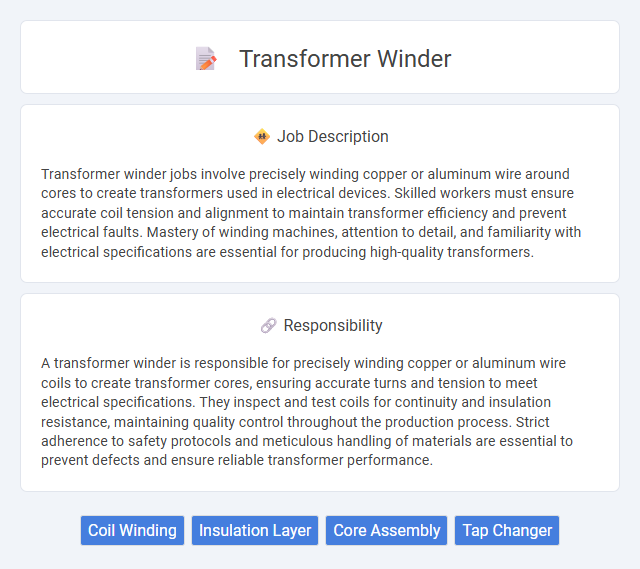
Transformer winder jobs involve precisely winding copper or aluminum wire around cores to create transformers used in electrical devices. Skilled workers must ensure accurate coil tension and alignment to maintain transformer efficiency and prevent electrical faults. Mastery of winding machines, attention to detail, and familiarity with electrical specifications are essential for producing high-quality transformers.
Individuals with good physical stamina and attention to detail are likely suitable for transformer winder jobs, as the role often involves repetitive manual tasks and precise winding processes. People who have steady hands and can maintain focus for extended periods might find this job manageable and rewarding. Those prone to fatigue or difficulty concentrating could struggle with the demands of this occupation.
Qualification
A Transformer winder must possess technical skills in electrical engineering and hands-on experience with coil winding techniques, including precise handling of copper wire and insulation materials. Proficiency in reading and interpreting electrical schematics, combined with knowledge of safety standards and troubleshooting procedures, is essential for quality and efficiency. Certification or vocational training in transformer manufacturing and winding technology significantly enhances job qualification and career prospects.
Responsibility
A transformer winder is responsible for precisely winding copper or aluminum wire coils to create transformer cores, ensuring accurate turns and tension to meet electrical specifications. They inspect and test coils for continuity and insulation resistance, maintaining quality control throughout the production process. Strict adherence to safety protocols and meticulous handling of materials are essential to prevent defects and ensure reliable transformer performance.
Benefit
The Transformer winder job likely offers benefits such as enhancing technical skills in electrical manufacturing and improving attention to detail through precise coil winding tasks. Workers probably gain experience that increases their employability in the power and electronics industries. This role may also provide opportunities for steady employment and potential career advancement within industrial production settings.
Challenge
Transformer winding likely presents significant challenges due to the precision required in coiling wire uniformly to ensure optimal electrical performance. Handling delicate materials and maintaining tight tolerances might increase the risk of defects, demanding high skill and attention to detail. The complexity of different transformer designs probably makes adapting techniques and troubleshooting variations a constant challenge for workers in this field.
Career Advancement
A transformer winder specializes in assembling and repairing electrical transformers by precisely winding wire coils, a critical skill in the electrical manufacturing and maintenance industries. Career advancement typically involves gaining expertise in complex winding techniques, mastering electrical schematics, and moving into supervisory or technical roles such as a lead technician or quality control inspector. Skilled transformer winders with strong technical knowledge and experience often transition into electrical engineering or project management positions within power generation and distribution companies.
Key Terms
Coil Winding
Coil winding in transformer manufacturing demands precision in layering insulated copper or aluminum wire to form magnetic cores essential for transformer efficiency and performance. Skilled coil winders must ensure tight, uniform windings to prevent short circuits and optimize electrical properties, using automated winding machines or manual techniques depending on transformer specifications. Mastery in coil winding directly influences transformer durability, voltage regulation, and operational reliability in power distribution and industrial applications.
Insulation Layer
The insulation layer in a transformer winder job is critical for preventing electrical short circuits and ensuring the transformer's longevity and efficiency. Technicians carefully apply high-quality insulating materials such as varnish, paper, or polymer films around the copper or aluminum windings to maintain proper dielectric strength. Precision in layering and uniform insulation thickness directly influences the transformer's performance and resistance to thermal and electrical stresses.
Core Assembly
Transformer winder specializing in core assembly ensures precise alignment and secure stacking of laminated steel cores to optimize magnetic flux efficiency. Expertise in accurately positioning core limbs and yokes directly impacts transformer performance by minimizing energy losses and mechanical vibrations. Mastery in using precise measuring tools and assembly techniques enhances durability and reduces the risk of core deformation during operation.
Tap Changer
A Transformer winder specializing in Tap Changers plays a crucial role in repairing and rewinding tap changer coils to ensure optimal voltage regulation and electrical performance. Precision in handling copper windings and insulation materials is essential to maintain the tap changer's ability to adjust transformer output voltage safely and efficiently. Expertise in diagnosing coil faults and executing precise rewinding directly impacts transformer reliability and lifespan.
 kuljobs.com
kuljobs.com